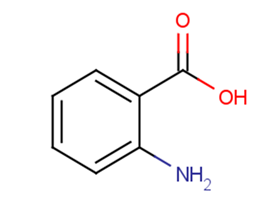
Anthranilic acid
CAS No. 118-92-3
Anthranilic acid( —— )
Catalog No. M19857 CAS No. 118-92-3
2-Aminobenzoic acid also known as anthranilate or anthranilic acid belongs to the class of organic compounds known as aminobenzoic acids.
Purity : >98% (HPLC)
 COA
COA
 Datasheet
Datasheet
 HNMR
HNMR
 HPLC
HPLC
 MSDS
MSDS
 Handing Instructions
Handing Instructions
| Size | Price / USD | Stock | Quantity |
| 100MG | Get Quote | Get Quote |


|
| 200MG | Get Quote | Get Quote |


|
| 500MG | Get Quote | Get Quote |


|
| 1G | Get Quote | Get Quote |


|
Biological Information
-
Product NameAnthranilic acid
-
NoteResearch use only, not for human use.
-
Brief Description2-Aminobenzoic acid also known as anthranilate or anthranilic acid belongs to the class of organic compounds known as aminobenzoic acids.
-
Description2-Aminobenzoic acid also known as anthranilate or anthranilic acid belongs to the class of organic compounds known as aminobenzoic acids. These are benzoic acids containing an amine group attached to the benzene moiety. 2-Aminobenzoic acid exists as a solid slightly soluble (in water) and a weakly acidic compound (based on its pKa). 2-Aminobenzoic acid has been found in human epidermis tissue and has also been primarily detected in feces urine blood and cerebrospinal fluid. Within the cell 2-aminobenzoic acid is primarily located in the cytoplasm and mitochondria. 2-Aminobenzoic acid exists in all eukaryotes ranging from yeast to humans. 2-Aminobenzoic acid participates in a number of enzymatic reactions. In particular 2-Aminobenzoic acid and formic acid can be biosynthesized from formylanthranilic acid through the action of the enzyme kynurenine formamidase. Furthermore 2-Aminobenzoic acid and L-alanine can be biosynthesized from L-kynurenine; which is catalyzed by the enzyme kynureninase. Furthermore Pyruvic acid L-glutamic acid and 2-aminobenzoic acid can be biosynthesized from chorismate and L-glutamine through its interaction with the enzyme anthranilate synthase component. Finally 2-Aminobenzoic acid and phosphoribosyl pyrophosphate can be converted into N-(5-phosphoribosyl)-anthranilate through the action of the enzyme anthranilate phosphoribosyltransferase. In humans 2-aminobenzoic acid is involved in the tryptophan metabolism pathway. Outside of the human body 2-aminobenzoic acid can be found in a number of food items such as alpine sweetvetch corn garden tomato and conch. This makes 2-aminobenzoic acid a potential biomarker for the consumption of these food products. 2-Aminobenzoic acid is a potentially toxic compound.
-
In Vitro——
-
In Vivo——
-
Synonyms——
-
PathwayOthers
-
TargetOther Targets
-
RecptorOthers
-
Research Area——
-
Indication——
Chemical Information
-
CAS Number118-92-3
-
Formula Weight137.14
-
Molecular FormulaC7H7NO2
-
Purity>98% (HPLC)
-
Solubility——
-
SMILESNc1ccccc1C(O)=O
-
Chemical Name——
Shipping & Storage Information
-
Storage(-20℃)
-
ShippingWith Ice Pack
-
Stability≥ 2 years
Reference
1.Patrone J. Pelz N. Bates B. Souza-Fagundes EM E. Vangamudi B. & Fesik S. (2019). Identification and Optimization of Anthranilic Acid Based Inhibitors of Replication Protein?A.?Chemmedchem.?11(8) 893-9. doi: 10.1002/cmdc.201500479
molnova catalog



related products
-
Menisdaurin
Menisdaurin is a natural product from Flueggea virosa.
-
1-(2-Hydroxyethyl)im...
Used as pharmaceutical intermediates.
-
Carbocisteine
Carbocysteine is a compound formed when the iodoacetic acid reacts with sulfhydryl groups in proteins. It has been used as an anti-infective nasal spray with mucolytic and expectorant action.



 Cart
Cart
 sales@molnova.com
sales@molnova.com


